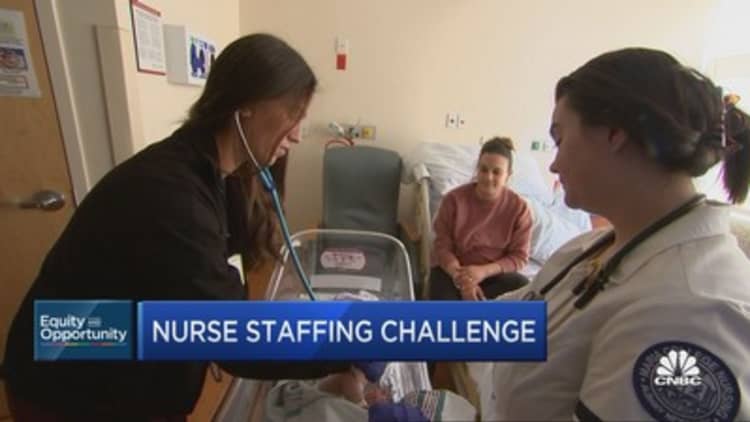With travel nurses making $150 an hour, hospital systems are forced to innovate

Cassie Jupin grew up wanting to be a nurse. She set her sights on a job at St. Peter’s Health Partners hospital in Albany, New York, and landed a position in the same maternity ward where she was born.
“Knowing that I can come back to work every single day and work with a group of women and people that just make it so easy” has been gratifying, Jupin said. “Like, everybody’s here to help you.”
Still, when she graduated from nursing school last July, she and her classmates joked about taking travel nurse jobs which paid a lot more than entry-level staff positions.
“They were up in like the $140s, $150s, depending on the area you were searching,” she explained. The pay wasn’t per day. It was per hour.
Over the last year, keeping nurses like Jupin on staff has ranked as the most pressing workforce issue for 90% of CEOs at community hospitals like St. Peter’s, according to a survey by the American College of Healthcare Executives.
Staff shortages
The pandemic has exacerbated nursing staff shortages and resulted in contract nursing rates surging during successive waves of Covid infections. During the omicron surge in the winter of 2022, national rates spiked to an average of $150 an hour, according to consulting firm Syntellis. That amounted to three times the national average for full-time staff nurses.
As hospitals have become increasingly reliant on contract nurses, travel nurse expenditures have risen more than 250% since the start of the pandemic.
“There continues to be significant volatility in hourly wages paid to registered nurses, which represent a significant share of overall labor costs,” said Flint Brenton, CEO of Syntellis Performance Solutions.
A nurse instructs a colleague while tending to a Covid patient in the Covid intensive care unit at Leipzig university hospital.
Sean Gallup | Getty Images News | Getty Images
At the same time, using high-paid workers from travel-nursing agencies also made for a vicious circle when it comes to staffing.
“Agency staff were paid significant salary rates and had complete control of their work schedules,” explained Carol Boston Fleischhauer, managing director and chief nursing officer at the Advisory Board, and as result “more in-house nurses left their permanent positions for external opportunities, increasing turnover.”

In-house travel nurses
St. Peter’s is part of Trinity Health System, which has not been immune to the need for contract nursing. But Trinity has been able to have more control over staff turnover by using its own in-house travel nurse program — an idea that stemmed from its own nurses over a decade ago.
“We realized that if we developed our own internal agency, if you will, we could orient people to Trinity Health for all of our hospitals,” said Jennifer Misajet, chief nursing officer at St. Peter’s hospital.
That internal program, called First Choice, grew threefold during the pandemic, as older nurses looked to scale back from full-time work, and younger nurses sought higher pay and greater flexibility over their working conditions.
“It’s not like the old days where nurses became inpatient nurses for 30 years. A lot of new graduates expect to work in an inpatient setting for only a few years, and then they want to get their master’s degree, or become nurse practitioners,” said Trinity CEO Mike Slubowski.
With nearly 90 hospitals in 26 states, First Choice has helped Trinity have better control over its contract nursing costs, while also maintaining ties with nurses who can help them maintain a consistent quality of care.
“If they wanted to work in a different location, for example, go to Fresno, California, or Boise, Idaho, to cover, you know, we have the same clinical information system everywhere … and so there’s a familiarity with providing care within that environment,” Slubowski said.
With more than 30,000 registered nurses in its system, nearly 1 in 10 of Trinity’s nurses currently work through First Choice. That now includes about a dozen senior leaders like Misajet at St. Peter’s.
“We really tried to meet our nurses where they are, and they’re in different places,” Misajet said. In her case, she’s gone part-time rather than retire, in order to spend more time with her family.
Paying more
Analysts say more hospitals are following Trinity’s lead and starting their own internal staffing programs to cut down on agency contract labor costs. At the same time, they’re also facing higher costs to hold on to their full-time staff nurses. Trinity boosted staff salaries by 5.5% in 2022, according to its latest financial statements.
For new nurses like Jupin, who might be tempted by high-paying travel nurse jobs, the message from hospital leadership is clear.
“They don’t want to see you walk away — especially our manager,” the maternity nurse said. “The first thing she’s always told us is ‘please come to us if you need anything, because we want you guys here for the long run.'”
Better pay and staffing conditions remain the top concerns for most nurses, according to a recent survey by the American Nurses Association, but for more than half of them, flexibility is also key. Increasingly, it’s proving to be key for hospital systems like Trinity, too.
For all the latest Health News Click Here
For the latest news and updates, follow us on Google News.

